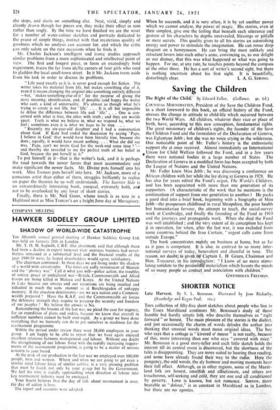Saving the Children
llic Right of the Child: By Edward Fuller. (Gollancz. 93. 6d.) COUNTESS MousrrasrrEN, President of the Save the Children Fund, in a short foreword to this book, an official history of the Fund, stresses the change in attitude to child-life which occurred between the two World Wars. All children, whatever their race or place of birth, have, according to' this new conception, fundamental rights. The great missionary of children's rights, the founder of the Save the Children Fund and the formulator of the Declaration of Geneva, was Eglantyne Jebb ; but she was no voice: crying in the wilderness. One noticeable point of Mr. Fuller's history is the enthusiastic support she at once received. Almost immediately an International • Union for Child Welfare followed the Fund, and in a few years there were national bodies in a large number of States. The Declaration of Geneva in a modified form has been accepted by both the League of Nations and the United Nations.
Mr. Fuller knew Miss Jebb ; he was discussing a conference on African children with her while she lay dying at Geneva in 1928. He has also for years edited the Fund's organ, The World's Children, and has been acquainted with more than one generation of its supporters. (A characteristic of the work that he mentions is the continuation of support from one generation to another.) He packs a good deal into a brief book, beginning with a biography of Miss Jebb—the prosperous childhood in rural Shropshire, the poor health but humanitarian fervour, the attempt to teach, the social-survey work at Cambridge, and finally the founding of the Fund in 1919 and the journeys and propaganda work. When she died the Fund was well established ; and the very extent of its conception has kept it in operation, for when, after the last war, it was excluded from some countries behind the Iron Curtain, urgent calls came from outside Europe." The book concentrates mainly on business at home, but as far as it goes is competent. It is also, in contrast to so many inter- national surveys of today, benevolent and cheerful in tone. The reason; no doubt; is given .11 Captain L. H Green, Chairman and Hon. Treasurer, in his introlimtion: " I know of no more stimu- lating antidote to the pessimIstIU materialism which haunts the minds of so many people as contact and association with children."
GWENDOLEN FREEMAN.






































 Previous page
Previous page